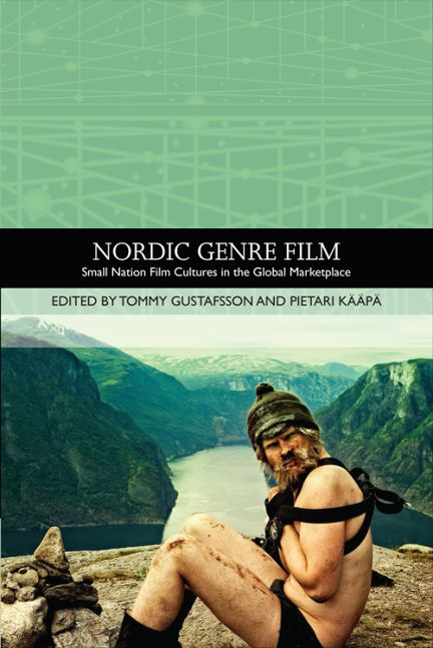Book contents
- Frontmatter
- Contents
- List of Illustrations
- List of Contributors
- Traditions in World Cinema
- Introduction: Nordic Genre Film and Institutional History
- PART I HERITAGE CINEMA AND NATIONAL NARRATIVES
- PART II CRIME AND DETECTIVE NARRATIVES
- PART III NORDIC OPTIMISM: ROAD MOVIES, COMEDIES AND MUSICALS
- 9 Fathers and Sons Reunited: Road Movies as Stories of Generational Continuity
- 10 The Nordic ‘Quirky Feel-Good’
- 11 Contesting Marriage: The Finnish Unromantic Comedy
- 12 Powered by Music: Contemporary Film Musicals, Nordic Style
- PART IV NORDIC HORRORS
- PART V GENRE BENDERS
- Index
12 - Powered by Music: Contemporary Film Musicals, Nordic Style
from PART III - NORDIC OPTIMISM: ROAD MOVIES, COMEDIES AND MUSICALS
Published online by Cambridge University Press: 25 October 2017
- Frontmatter
- Contents
- List of Illustrations
- List of Contributors
- Traditions in World Cinema
- Introduction: Nordic Genre Film and Institutional History
- PART I HERITAGE CINEMA AND NATIONAL NARRATIVES
- PART II CRIME AND DETECTIVE NARRATIVES
- PART III NORDIC OPTIMISM: ROAD MOVIES, COMEDIES AND MUSICALS
- 9 Fathers and Sons Reunited: Road Movies as Stories of Generational Continuity
- 10 The Nordic ‘Quirky Feel-Good’
- 11 Contesting Marriage: The Finnish Unromantic Comedy
- 12 Powered by Music: Contemporary Film Musicals, Nordic Style
- PART IV NORDIC HORRORS
- PART V GENRE BENDERS
- Index
Summary
THE MUSICAL AS (AN AMERICAN) GENRE
When thinking about Nordic cinema, the musical is not the first genre to come to mind. This holds true for the global audiences as well as for Nordic ones, nowadays and in retrospect. The film musical, in some kind of down-to-earth classical generic sense, is for a Western audience most probably associated with Hollywood films from the 1930s and onwards, with an obvious decline after the successful productions Mary Poppins (1964) and The Sound of Music (1965). Some European musicals are probably also well-known to the nonspecialist public, such as Jacques Demy's Les Parapluies de Cherbourg (The Umbrellas of Cherbourg, 1964) and Les Demoiselles de Rochefort (The Young Girls of Rochefort, 1967). Since then musicals have changed or transformed. Even if some characteristics usually connected with the genre are still in use, they are now often utilised in an excessive or transformed way (Altman 1987; Grant 2012).
It is not at all curious that audiences in general, at least Western audiences, link musicals primarily to Hollywood. After all, it was a very important genre for the American film industry as well as for the music industry. The films were a feast for the eye which attracted audiences globally, and songs and music from the musicals had worldwide appeal. Some of the most renowned scholars even write from the standpoint that, in a strict sense, only Hollywood musicals can be classified as musicals. In his essay in The Oxford History of World Cinema, Rick Altman argues that Hollywood is the only film industry that has produced films that match the genre. Consequently Altman asserts: ‘To study the musical is thus primarily to analyze the history of Hollywood's 1,500 or so musical films’ (Altman 1996: 294). Jane Feuer also, more or less without discussion, writes about musicals as a Hollywood phenomenon in her classical book The Hollywood Musical from 1993. And an overwhelming corpus of books about the musical, as genre and as history, has titles that directly state the musical to be an American or Hollywoodian cultural product.
- Type
- Chapter
- Information
- Nordic Genre FilmSmall Nation Film Cultures in the Global Marketplace, pp. 173 - 186Publisher: Edinburgh University PressPrint publication year: 2015



